As Trump cases end, what next for presidents and the law?
Loading...
Two years ago, America sat at a daunting crossroads.
Former President Donald Trump faced four separate criminal indictments. The United States was not only polarized over those indictments, but also staring down an uncertain future. America had never prosecuted a former president. How would that play out?
America may never know. Three of the cases against Mr. Trump never went to trial, and the one that did ended with a conviction but no punishment for the president-elect.
Why We Wrote This
The prospect of a former president facing four separate criminal trials divided Americans – but has now evaporated. Beyond the details of the cases themselves, America is opening a new chapter on questions of presidential accountability.
It has undoubtedly been the best possible outcome for Mr. Trump, who maintained his innocence in every case. But has the country been saved from a potentially democracy-fracturing legal battle? Or has it turned down a more troubling path where presidential accountability may be all but extinct?
The last time the country sat at such a crossroads, after the Watergate scandal in 1972, the president, Richard Nixon, also avoided criminal prosecution. But that scandal triggered a push for transparency and political reform in Washington, says Julian Zelizer, a historian at Princeton University.
Today, however, “We’re in an era where that just doesn’t trigger the same kind of political response,” he says. “The presidency seems in many ways more isolated, more protected, and more able to do whatever it wants.”
“Ugly passions” avoided again?
There have historically been two methods for holding U.S. presidents accountable: political and legal. Political accountability comes through elections and impeachment. Legal accountability comes through the courts. Mr. Trump survived two impeachment votes while in office, and he has pointed to his reelection as proof that the American people don’t think he should be held accountable for his alleged crimes.
As he maintained his innocence throughout two years of legal battles, Mr. Trump also repeatedly blasted the prosecutions as unjust and politically motivated “lawfare.”
“It’s a horrible thing for this country,” he said in June 2023, referring to the multiple criminal indictments against him.
Democrats, he charged, are “using the same corrupt [Department of Justice] and the same corrupt FBI, and the attorney general and the local district attorneys to interfere” in his political ambitions.
Prosecutions of former presidents have been rare in U.S. history, but when they have loomed, so have fears that they could break the country beyond repair. Most famously, after Watergate, President Gerald Ford pardoned Mr. Nixon, in part to spare the country a bitter and divisive trial.
“Ugly passions would again be aroused, our people would again be polarized in their opinions, and the credibility of our free institutions of government would again be challenged,” said President Ford when he issued the pardon.
The Nixon pardon was unpopular at the time, but as the years went on, it came to be viewed more positively as a necessary step to help the country move on. A few years later, the U.S. Supreme Court ruled that former presidents are immune from civil cases. But it left the question of criminal immunity unanswered.
Mr. Trump faced criminal charges in two federal cases and two state cases. At the federal level, Jack Smith, a special counsel appointed by Attorney General Merrick Garland, charged the former president in Washington, D.C., with conspiracy and obstruction in a case related to his attempts to stay in power after his 2020 election defeat. Mr. Smith also charged Mr. Trump in Florida with unlawfully retaining classified documents.
Fani Willis, a state prosecutor in Fulton County, Georgia, similarly charged Mr. Trump in a case related to his efforts to overturn the 2020 election results there. Meanwhile, a state prosecutor in Manhattan charged – and convicted – the president-elect on business fraud charges related to hush money payments.
The other three prosecutions never came close to trial. Even in the Manhattan case, where a jury convicted Mr. Trump of 34 felonies, he successfully delayed his sentencing twice. While he was finally sentenced last week, the judge gave him no punishment, citing the proximity of his upcoming presidential term.
In short, through political popularity and zealous legal defense, Mr. Trump has largely avoided accountability for his efforts to overturn the 2020 election result and other alleged crimes.
Unique defendant, unique benefits
Being a unique defendant helped. In addition to having skilled lawyers, Mr. Trump had a status as a former and potentially future president, which came to his aid numerous times as he fought the cases against him.
During Mr. Trump’s trial in Manhattan, Judge Juan Merchan found him in contempt of court 10 times for violating a gag order. While many defendants would have received a short jail sentence in that situation, experts say, the judge held back. “Mr. Trump ... the last thing I want to do is put you in jail,” Judge Merchan said at the time. “You are the former president of the United States and possibly the next president as well.”
In the Florida case, a complex federal prosecution that required extensive pretrial discovery, the presiding judge gave Mr. Trump an early win when she ruled that a special master was needed to oversee the classified documents at issue. Such a step was necessary because Mr. Trump’s “former position as president” meant he faced “reputational harm of a decidedly different order of magnitude” from an ordinary defendant, the judge wrote.
An appeals court overturned that order. But the Florida judge, U.S. District Judge Aileen Cannon, later dismissed the case on the grounds that Mr. Smith had been unlawfully appointed.
But the failure of the Florida case was not the most seismic decision to come out of this American legal saga. Instead, the defining precedent from the Trump cases will be how difficult they made it for former presidents to be criminally prosecuted in the future.
“One of the biggest, if not the biggest, tragedies for democracy and the rule of law that came out of these was [the ruling in] Trump v. United States,” says Kimberly Wehle, a professor at the University of Baltimore Law School.
In that case, which emerged from the Washington prosecution of Mr. Trump, the Supreme Court ruled for the first time that former presidents have criminal immunity for “official acts” performed while in office.
In the majority opinion, Chief Justice John Roberts voiced concerns about “enfeebling” the presidency by leaving it vulnerable to “routine” criminal prosecutions. A former president “must” have criminal immunity, he added, unless the government can prove the prosecution “would pose no ‘dangers of intrusion on the authority and functions of the Executive Branch.’”
In practice, future prosecution of an ex-president would require that the charges relate to acts the court determines to be outside of the president’s official duties.
A new era
The executive branch is the nimblest and fastest-moving branch of American government. So wanting to protect it from potentially frivolous lawsuits has some merit. But critics worry that as a result of the recent Trump-related decisions, the presidency may now have too much protection.
Routine criminal prosecutions of former presidents “wasn’t a problem in the first 240 years of our history,” says Professor Wehle. The Supreme Court “seemed to be really worried about rogue prosecutors, much more worried about rogue prosecutors than rogue presidents,” she adds.
Now, she continues, it’s “virtually impossible” to criminally prosecute a former president in the U.S.
Some argue that’s not a bad thing. Prosecuting a former president is one of the toughest stress tests a democracy can face. Shouldn’t the bar for engaging in that be high?
“There are fear factors that are totally legitimate,” says Laura Thornton, a senior director at the McCain Institute at Arizona State University. “No one wants short-term conflict. But the long-term degradation of democracy is worse.”
As it now stands, the U.S. has avoided the short-term conflict of Mr. Trump facing further criminal trials. After Mr. Trump’s reelection, Mr. Smith dropped the federal cases against the president-elect, citing a Justice Department policy that a sitting president cannot be prosecuted. Last month, the Georgia case collapsed after a state appeals court dismissed Ms. Willis due to a conflict of interest related to her hiring of an assistant for the case.
But while stressful, the test of a presidential prosecution can also reveal strengths that a democracy may not have known it had.
“Why are we so afraid?” Ms. Thornton asks. “In a way, it’s an admission of weakness in our system, but also of weakness in ourselves.”
Ms. Thornton, who has spent decades advising burgeoning democracies worldwide, has seen firsthand that nations can come out the other side of such turbulent times stronger and better.
“Strong democracies can get through this OK,” she says. “The sky does not fall.”








